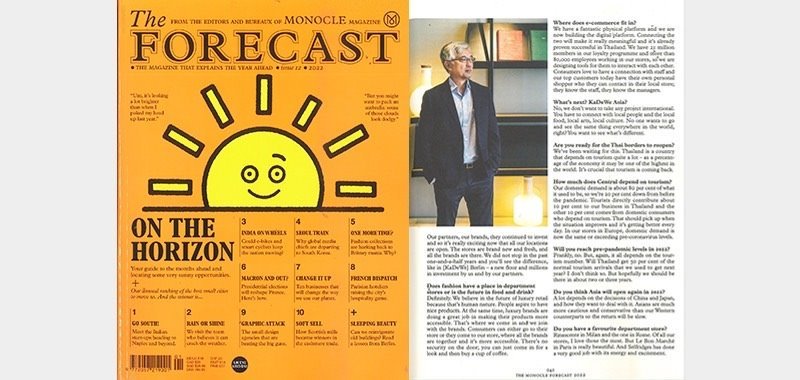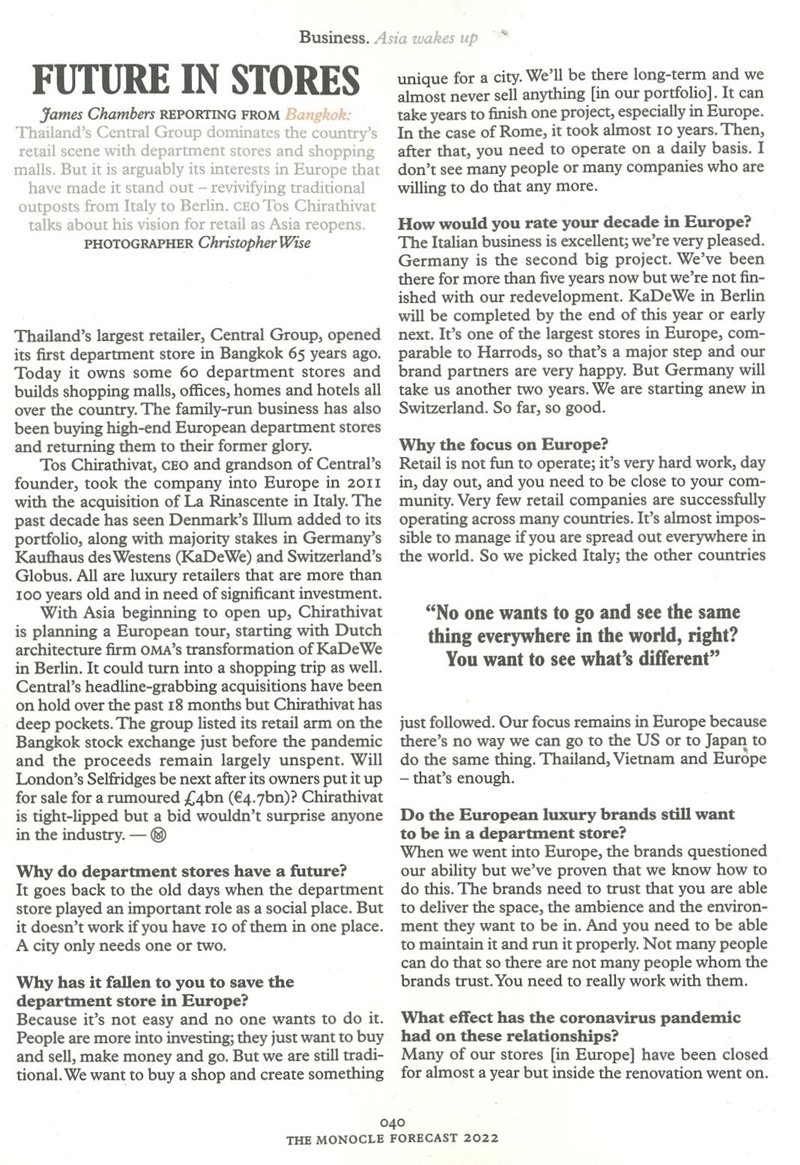
FUTURE IN STORES
James Chambers REPORTING FROM Bangkok:
Thailand's Central Group dominates the country's retail scene with department stores and shopping malls. But it is arguably its interests in Europe that have made it stand out - revivifying traditional outposts from Italy to Berlin. CEO Tos Chirathivat talks about his vision for retail as Asia reopens.
Thailand’s largest retailer, Central Group, opened its first department store in Bangkok 65 years ago. Today it owns some 60 department stores and builds shopping malls, offices, homes and hotels all over the country. The family-run business has also been buying high-end European department stores and returning them to their former glory.
Tos Chirathivat, CEO and grandson of Central’s founder took the company into Europe in 20II with the acquisition of La Rinascente in Italy. The past decade has seen Denmark's Illum added to its portfolio, along with majority stakes in Germany's Kaufhaus des Westens (KaDeWe) and Switzerland's Globus. All are Luxury retailers that are more than 100 years old and in need of significant investment.
With Asia beginning to open up, Chirathivat is planning a European tour, starting with Dutch architecture firm OMA's transformation of KaDeWe in Berlin. It could turn into a shopping trip as well. Central's headline-grabbing acquisitions have been on hold over the past 18 months but Chirathivat has deep pockets. The group listed its retail arm on the Bangkok stock exchange just before the pandemic and the proceeds remain largely unspent. Will London's Selfridges be next after its owners put it up for sale for a rumoured £4bn (€4.7bn)? Chirathivat is tight-lipped but a bid wouldn't surprise anyone in the industry.
Why do department stores have a future?
It goes back to the old days when the department store played an important role as a social place. But it doesn't work if you have 10 of them in one place. A city only needs one or two.
Why has it fallen to you to save the department store in Europe?
Because it's not easy and no one wants to do it. People are more into investing; they just want to buy and sell, make money and go. But we are still traditional. We want to buy a shop and create something unique for a city. We'll be there long-term and we almost never sell anything [in our portfolio]. It can take years to finish one project, especially in Europe. In the case of Rome, it took almost 10 years. Then, after that, you need to operate on a daily basis. I don't see many people or many companies who are willing to do that anymore.
How would you rate your decade in Europe?
The Italian business is excellent; we're very pleased. Germany is the second big project. We've been there for more than five years now but we're not finished with our redevelopment. KaDeWe in Berlin will be completed by the end of this year or early next. It's one of the largest stores in Europe, comparable to Harrods, so that's a major step and our brand partners are very happy. But Germany will take us another two years. We are starting anew in Switzerland. So far, so good.
Why the focus on Europe?
Retail is not fun to operate; it's very hard work, day in, day out, and you need to be close to your community. Very few retail companies are successfully operating across many countries. It's almost impossible to manage if you are spread out everywhere in the world. So we picked Italy; the other countries
"No one wants to go and see the same thing everywhere in the world, right? You want to see what's different"
just followed. Our focus remains in Europe because there's no way we can go to the US or to Japan to do the same thing. Thailand, Vietnam and Europe – that’s enough.
Do the European luxury brands still want to be in a department store?
When we went into Europe, the brands questioned our ability but we've proven that we know how to do this. The brands need to trust that you are able to deliver the space, the ambience and the environment they want to be in. And you need to be able to maintain it and run it properly. Not many people whom the brands trust. You need to really work with them.
What effect has the coronavirus pandemic had on these relationships?
Many of our stores [in Europe] have been closed for almost a year but inside the renovation went on. Our partners, our brands, they continued to invest and so it's really exciting now that all our locations are open. The stores are brand new and fresh, and all the brands are there. We did not stop in the past one-and-a-half years and you'll see the difference, like in [KaDeWe] Berlin - a new floor and millions in investment by us and by our partners.
Does fashion have a place in department stores or is the future in food and drink?
Definitely. We believe in the future of luxury retail because that's human nature. People aspire to have nice products. At the same time, luxury brands are doing a great job in making their products more accessible. That's where we come in and we join with the brands. Consumers can either go to their store or they come to our store, where all the brands are together and it's more accessible. There's no security on the door; you can just come in for a look and then buy a cup of coffee.
Where does e-commerce fit in?
We have a fantastic physical platform and we arevnow building the digital platform. Connecting the two will make it really meaningful and it's already proven successful in Thailand. We have 2I million members in our loyalty programme and more than 80,000 employees working in our stores, so' we are designing tools for them to interact with each other. Consumers love to have a connection with staff and our top customers today have their own personal shopper who they can contact in their local store; they know the staff, they know the managers.
What's next? KaDeWe Asia?
No, we don't want to take any project international. You have to connect with local people and the local food, local arts, local culture. No one wants to go and see the same thing everywhere in the world, right? You want to see what's different.
Are you ready for the Thai borders to reopen?
We've been waiting for this. Thailand is a country that depends on tourism quite a lot - as a percent- age of the economy it may be one of the highest in the world. It's crucial that tourism is coming back.
How much does Central depend on tourism?
Our domestic demand is about 80 per cent of what it used to be, so we're 20 percent down from before the pandemic. Tourists directly contribute about 10 per cent to our business in Thailand and the other 10 per cent comes from domestic consumers who depend on tourism. That should pick up when the situation improves and it's getting better every day. In our stores in Europe, domestic demand is now the same or exceeding pre-coronavirus levels.
Will you reach pre-pandemic levels in 2022?
Frankly, no. But, again, it all depends on the tourism number. Will Thailand get so per cent of the normal tourism arrivals that we used to get next year? I don't think so. But hopefully we should be there in about two or three years.
Do you think Asia will open again in 2022?
A lot depends on the decisions of China and Japan, and how they want to deal with it. Asians are much conservative than our Western counterparts so the return will be slow.
Do you have a favourite department store?
Rinascente in Milan and the one in Rome. Of all our stores, I love those the most. But Le Bon Marche in Paris is really beautiful. And Selfridges has done a very good job with its energy and excitement.


